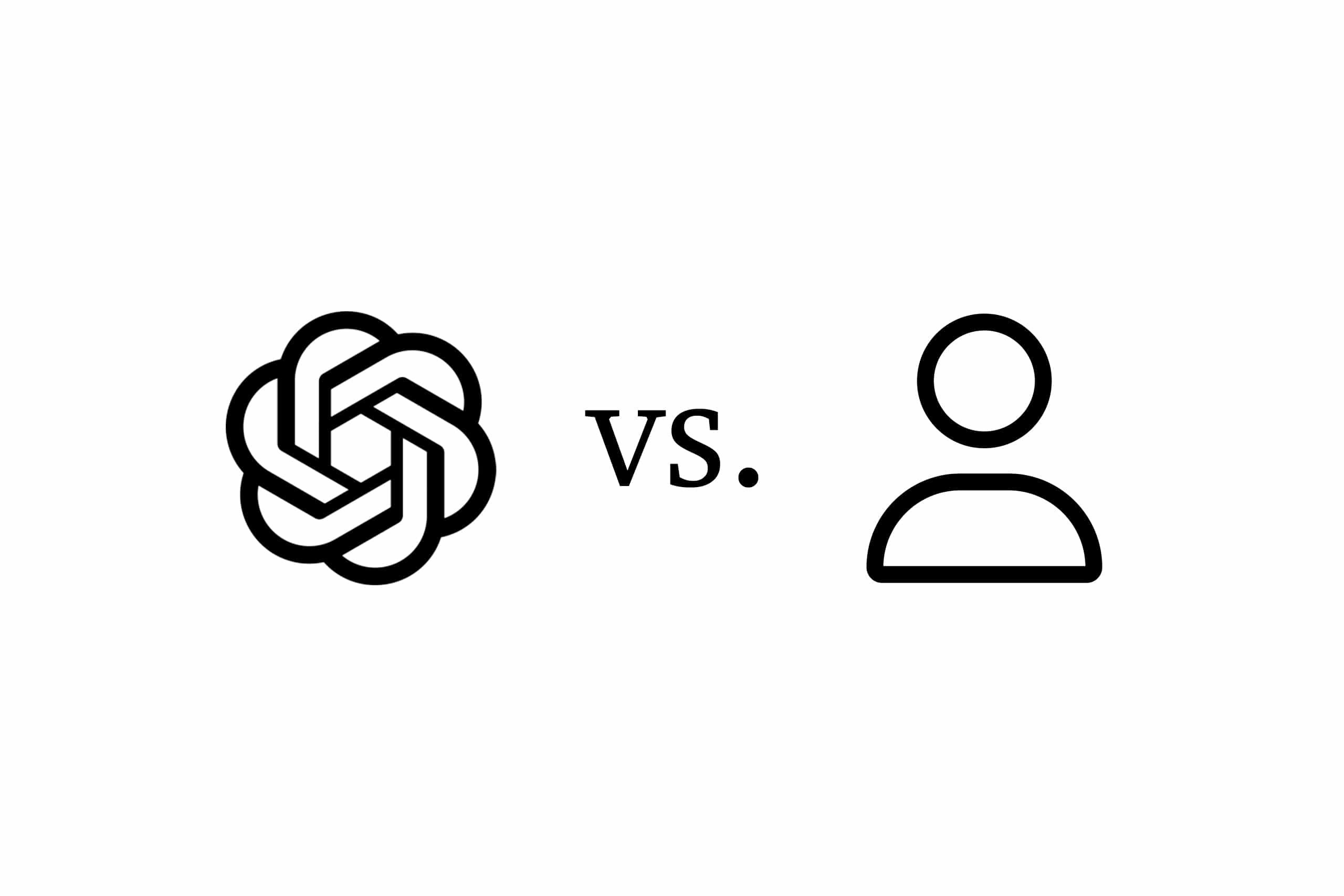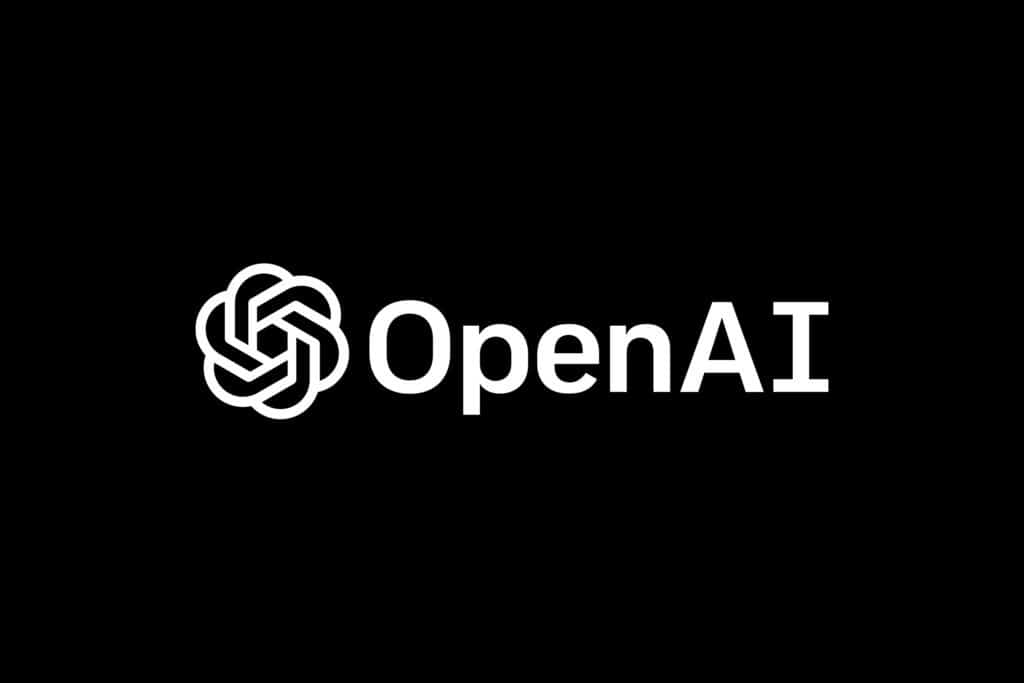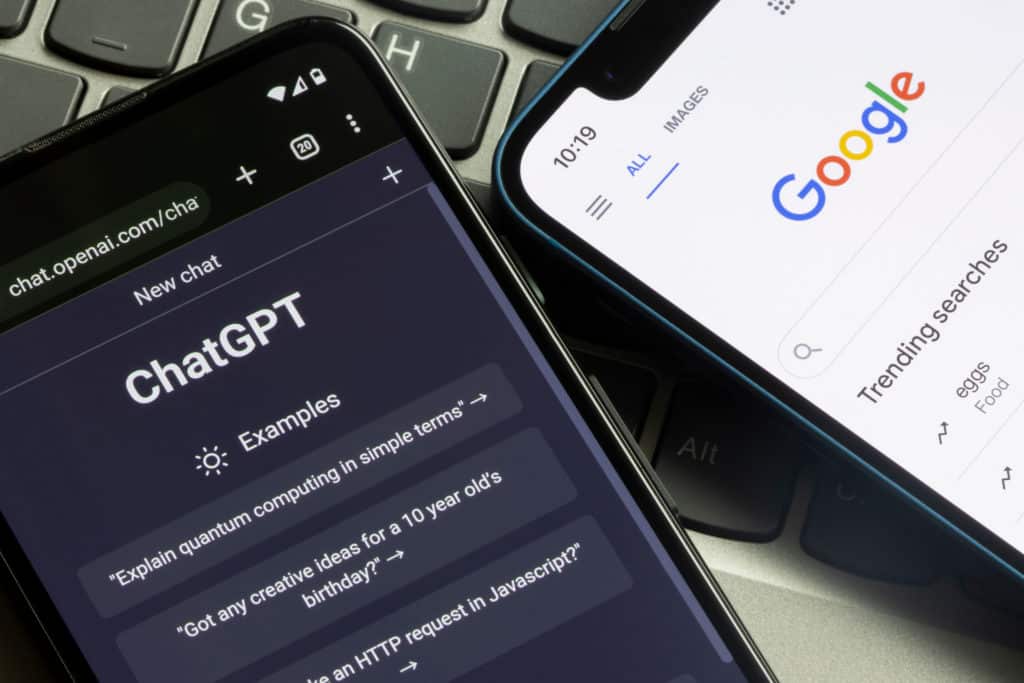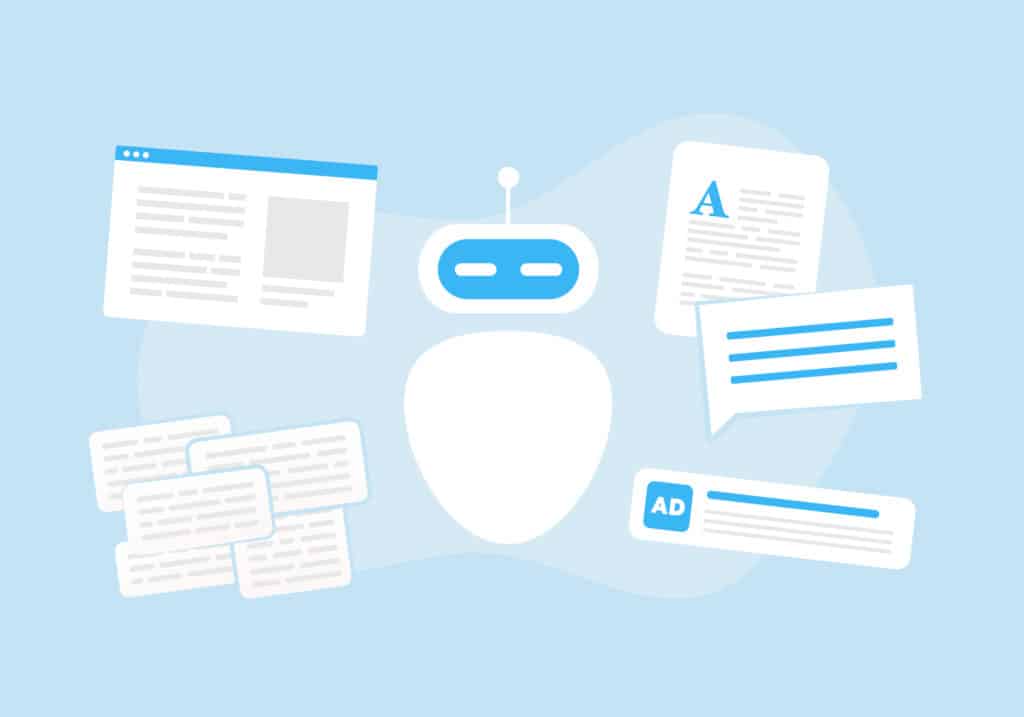
Will ChatGPT replace people? (Why we still need humans for marketing in 2023): The development of artificial intelligence (AI) technologies has revolutionized the way we do things—and that's putting it lightly. From automating mundane tasks to enabling more complex analysis and decision-making, AI has become an integral part of modern life.
With the emergence of ChatGPT, a new AI-driven system for generating natural language and conversations, it is clear that AI is making its presence felt in the field of marketing. But while ChatGPT has the potential to streamline and optimize marketing strategies, it can never fully replace the human touch (or, for now, at least).
In this blog, we'll discuss why humans will still be necessary for marketing in 2023 and into the near future and the potential implications of ChatGPT for the industry.
The human touch is still essential for creating effective marketing strategies.
People can understand customer needs and preferences more easily than ChatGPT and develop creative strategies that are unique and tailored to a specific audience. Despite the potential of ChatGPT, it is unlikely to replace people in marketing in the foreseeable future completely. As such, marketers should continue to invest in human capital and use AI tools to supplement their efforts.
To learn more about how AI can be used for marketing, specifically, SEO, read our post about how to use AI for SEO.

What is ChatGPT?
ChatGPT is a natural language processing (NLP) chatbot designed to understand and respond to text conversations. It uses a deep learning model based on GPT-3 (Generative Pre-trained Transformer-3), a large-scale transformer-based language model developed by OpenAI. ChatGPT is designed to understand and respond to conversations, with the goal of minimizing the need for manual coding.
Its primary purpose is to provide automated customer service and support. Still, it can also be used for other conversational applications such as natural language understanding, dialogue systems, and question-answering. ChatGPT is trained using a large dataset of conversations, which it uses to create human-like responses tailored to the context. (Ironically, these last two paragraphs were written using OpenAI, the platform that powers ChatGPT).
While ChatGPT has the potential to be a powerful tool for marketers, it still has some limitations that make it unsuitable for specific tasks, such as creating personalized customer experiences. And while many are predicting the AI takeover of 2023, AI is still in its infancy and only does what humans tell it to do. Until we get to the point where AI can make conscious decisions without any instruction from a human, it's safe to say AI bots will not be taking over the world just yet.
How is AI technology used in marketing?
AI technology in marketing is becoming increasingly important with the rapid technological advancements. AI can automate mundane, repetitive tasks, freeing up time for marketers to focus on more creative and strategic tasks. AI can also provide deep insights into customer behavior, such as buying patterns, preferences, and interests.
With this data, marketers can better target their campaigns and messages to the right audience. AI can also help human marketers with personalization, providing customers with a more tailored and relevant experience (although, as we stated before, AI still needs many directives to achieve this, which requires human creativity).
AI technology can also manage and optimize marketing campaigns in real-time. This allows marketers to quickly adjust their campaigns to take advantage of opportunities and minimize losses. AI can also automate customer service, allowing faster and more accurate responses to customer inquiries. AI can even help predict customer needs based on patterns, allowing marketers to create more relevant and engaging content.
AI is an invaluable tool for modern marketers, allowing them to maximize their efforts and get the most out of their campaigns. But how, exactly, does AI tie into ChatGPT and marketing, you might ask? Keep reading to find out!

What can ChatGPT do?
With ChatGPT, users can ask a chatbot a question, and the chatbot can generate a response similar to what a human would say. ChatGPT can also generate more natural-sounding conversation when interacting with existing chatbot applications, as it can be trained on domain-specific data.
This makes it possible to create a more engaging experience for users. So with that all said, let's take a look at how ChatGPT can be integrated into a 2023 marketing approach:
Automate customer service
ChatGPT is a customer service automation tool that enables businesses to create automated customer experiences using chatbots and voice bots powered by artificial intelligence and natural language processing. ChatGPT combines these technologies to create a powerful and efficient customer support solution.
ChatGPT can be used to create chatbots that can be used to respond to customer inquiries and provide answers to frequently asked questions. These chatbots can be configured to understand customer requests and provide immediate answers without needing a human agent (hello, balling on a budget!).
Additionally, ChatGPT can be used to create voice bots, which are automated assistants that can answer customer questions and provide information about products, services, and promotions. This allows businesses to create automated conversations that can understand customer intent and provide relevant responses. This can help reduce customer wait times and provide a more efficient customer service experience without needing a human.
Create personalized content
ChatGPT can create personalized content for marketing purposes by leveraging natural language processing (NLP) technology. This technology allows the platform to generate content based on user inputs, which can be used to create personalized content that humans can leverage for their marketing strategy.
For example, the platform can generate customer-specific product recommendations tailored to their interests. It can also generate personalized emails or content that meets customers' needs or preferences. ChatGPT can also use natural language generation (NLG) technology to create real-time conversations with customers.
For example, the platform can generate conversations that ask customers questions about their needs and preferences and then use this information to generate product recommendations tailored to their interests. (Think of all those ads you see in your Facebook feed after you say something out loud to your friends; that's a prime example of an AI bot listening to your conversations and showing you tailored ads; even though Facebook denies listening to us, we all know they do).
ChatGPT also uses machine learning technology to create personalized content. This technology allows the platform to learn from customer conversations and generate content tailored to their needs and preferences.
Analyze customer data
ChatGPT parses customer data using deep learning algorithms to identify and extract relevant data points. These data points can include customer demographics, interests, preferences, shopping behaviors, and more.
This information is then used to create customer profiles, which can be used to develop marketing strategies. Once the customer profiles are established, ChatGPT can analyze the customer data to find common themes, trends, and patterns.
This data can then create more targeted and personalized marketing campaigns. For example, marketers can use the data to learn which customers respond best to certain ads or content and tailor their campaigns accordingly.
ChatGPT also offers features such as auto-complete and auto-respond, which can help save time and resources. Automatically responding to customer queries and completing customer forms can help reduce the time required to respond to customer inquiries and free up resources for other marketing efforts.
In addition, ChatGPT can monitor customer conversations, which can help marketers gain valuable insights into customer sentiment and behavior. This data can then be used to refine marketing strategies further and better understand customer needs and wants.
ChatGPT is a powerful tool for analyzing customer data and helping with marketing efforts. By leveraging deep learning algorithms and artificial intelligence, marketers can gain insights into customer behavior and develop more targeted and effective marketing campaigns.

What ChatGPT can’t do
ChatGPT is a powerful tool for automating customer service conversations, but it is still not a replacement for human marketers. ChatGPT is based on natural language processing algorithms that are still limited in their ability to comprehend the nuances of human language.
Human marketers can provide a deeper understanding of customer needs and anticipate customer needs in a way that ChatGPT cannot. Additionally, human marketers can build customer relationships that are impossible with ChatGPT. Therefore, ChatGPT can be a helpful tool, but it is not a replacement for human marketers (just yet).
Let's take a deeper look at some specific examples of what ChatGPT cannot do:
Understand customer sentiment
The ChatGPT algorithm is trained on large amounts of text data, which it uses to build a natural language model. However, while the algorithm is good at understanding the syntax and structure of written language, it cannot understand the underlying sentiment of customers.
Humans, on the other hand, can interpret the subtle nuances of language and understand the emotional intent of customers. This is something that ChatGPT cannot do, as it relies solely on the text data it has been trained on.
Furthermore, humans can pick up on nonverbal cues such as tone of voice and body language, which ChatGPT cannot do. In addition, humans are also able to recognize context, which is something that ChatGPT cannot do. For example, humans can understand the context of a conversation and how it relates to the customer's overall sentiment. This allows marketers to tailor their response to the customer, which, again, ChatGPT cannot do.
Develop meaningful relationships
ChatGPT lacks the ability to develop meaningful customer relationships as a human marketer can. ChatGPT is limited in comprehending customer needs, nuances, and context. It cannot respond to unstructured customer inquiries or requests, as it is trained using predefined data sets. This prevents ChatGPT from making meaningful connections with customers, as it cannot account for their individual needs and preferences.
In addition, ChatGPT cannot detect customer emotions, provide empathy, or build rapport. It cannot provide the same level of personalized customer service as a human marketer can. Still, AI technology can help people understand their customers' patterns, allowing them to create a more unique experience. Which brings me to my next point...
Create unique marketing strategies
Its ability to generate content is based on its ability to detect patterns and generate output based on those patterns. While it can generate content similar to what a human marketer might generate, it cannot develop unique marketing strategies the way a human marketer can. Unlike a human marketer, ChatGPT cannot think creatively and strategically.
It cannot consider the overall context of a situation or the past experiences of its users, which are essential elements in creating a unique marketing strategy. It also lacks the ability to incorporate any emotional appeal into its strategies, which is something that human marketers can do. Additionally, ChatGPT cannot understand the needs and wants of its users or research the competition and market trends to identify opportunities for unique strategies.
Furthermore, it cannot generate ideas based on its own experience or knowledge or draw from outside sources of information and insights. ChatGPT cannot understand the importance of timing or context when executing marketing strategies and cannot understand the implications of different strategies or adapt them based on changing market conditions.

The Future of AI and Marketing
AI can automate many aspects of the marketing workflow, freeing up time for more creative tasks. For example, AI-powered chatbots can answer customer inquiries and provide personalized recommendations, while AI-assisted analytics can better understand customer behavior and preferences.
AI-powered tools can also automate marketing tasks such as content creation, email campaigns, and social media management. So what's the bottom line with AI, ChatGPT, and Google Bard (what a **not great** name, in my opinion)?
Benefits of AI in marketing
- AI can help marketers identify customer needs and interests: AI can quickly analyze large amounts of data to detect patterns and identify customer preferences. It allows marketers to target their messages better and create more personalized experiences.
- AI can help automate manual marketing tasks: AI can automate mundane tasks such as data entry and segmentation, freeing marketers to focus on more creative activities.
- AI can optimize marketing campaigns: AI can optimize campaigns in real time, allowing marketers to adjust their strategies on the fly.
- AI can help marketers detect and respond to customer sentiment: AI can quickly detect changes in customer sentiment and help marketers adjust their strategies accordingly.
- AI can help marketers personalize experiences: AI can create dynamic, personalized content tailored to each customer's preferences.
Potential drawbacks of AI
- Lack of creativity: AI-driven marketing is often limited to delivering pre-programmed responses and lacks the creativity and uniqueness of a human-driven approach.
- Lack of customer understanding: AI cannot capture the nuances and complexities of customer preferences and behavior, which can result in ineffective campaigns and customer dissatisfaction.
- Cost: AI-driven marketing requires access to expensive hardware and software and trained personnel to manage and maintain it. This can be cost-prohibitive for many companies. On the other hand, platforms like OpenAI are constantly working to make AI readily available to the public for a minuscule amount of money.
- Data security: AI-driven marketing requires access to large amounts of customer data, which can be vulnerable to cyber-attacks and data breaches.
- Ethical issues: AI-driven marketing systems can target vulnerable individuals or manipulate public opinion, leading to serious ethical issues.
- Lack of trust: AI-driven marketing can often come across as impersonal or robotic, which can lead to a lack of trust from customers.
In Summary
ChatGPT and AI have revolutionized marketing by automating mundane tasks and allowing businesses to gain valuable insights from data. However, these technologies are not able to replace the creative and strategic capabilities of humans and the ability to engage with customers on an emotional level.
AI and ChatGPT can help marketers make better decisions, but they cannot replace the human touch. Ultimately, ChatGPT and AI will not eliminate the need for humans in marketing. They can help automate specific tasks but cannot replace the human creativity and insight essential to successful marketing campaigns.
The need for humans in marketing in 2023
Marketing is about connecting to people on an emotional level, and for that, we still need humans. Although artificial intelligence and automation have helped us to scale marketing campaigns, they cannot replicate the ability of a human to understand customer needs and truly develop relationships. Humans can use their intuition, experience, and creativity to develop unique and innovative campaigns tailored to each customer’s needs.
Additionally, humans can provide a personal touch to campaigns that cannot be replicated by AI or automation. Humans also serve as the main point of contact between a company and its customers. They can provide timely and accurate responses to customer inquiries, as well as provide personalized customer service. Humans can also use emotional intelligence to build customer relationships and influence buying decisions.
This is something that no AI or automation can do. For these reasons, humans will still be needed for marketing in 2023 and the foreseeable future.
Benefits of using both AI and human marketing professionals
Leveraging both humans and AI technology in marketing offers a variety of benefits. The combination of human and AI technology provides a powerful tool that can be used to create more effective marketing campaigns. By combining the creativity and strategic thinking of humans with the data and automation capabilities of AI, marketers can drive better results and increase their ROI.
If you can't fathom using a robot to market for you, contact us today (real people) who do real work that impacts businesses across Colorado and the surrounding states. But before you contact us, promise us one thing: don't be a robot.
Will ChatGPT replace people?
The short answer is yes and no. ChatGPT, much like all new things, is still in its infancy. Can and will it replace the need for thousands of customer service representatives? Most definitely. But will ChatGPT completely replace the need for people? Most definitely not.
Robots will take over many jobs. But that is nothing new. Since the dawn of computers, we have been finding ways to automate menial tasks to accelerate our growth and create new and exciting technological advancements. Take manufacturing plants, for example; more robots are making your car nowadays than people. And with the launch of ChatGPT, nothing about that principle will change.
Sure, many jobs will be taken over by AI bots, but at the same time, many new jobs we would never have thought possible will reveal themselves thanks to those AI bots and ultimately continue to launch us into the future. Do you think Henry Ford thought his company would eventually need to hire people to program robots to build their cars? Probably not. So in my humble opinion, it is unwise to linger over the idea that robots will replace humans in the near future because, at the end of the day, robots still only do what we tell them to.
Okay, now that I've spent four hours writing this blog, I think it's time to start thinking about finding an AI assistant to help me save time. 😎 What do you think?


